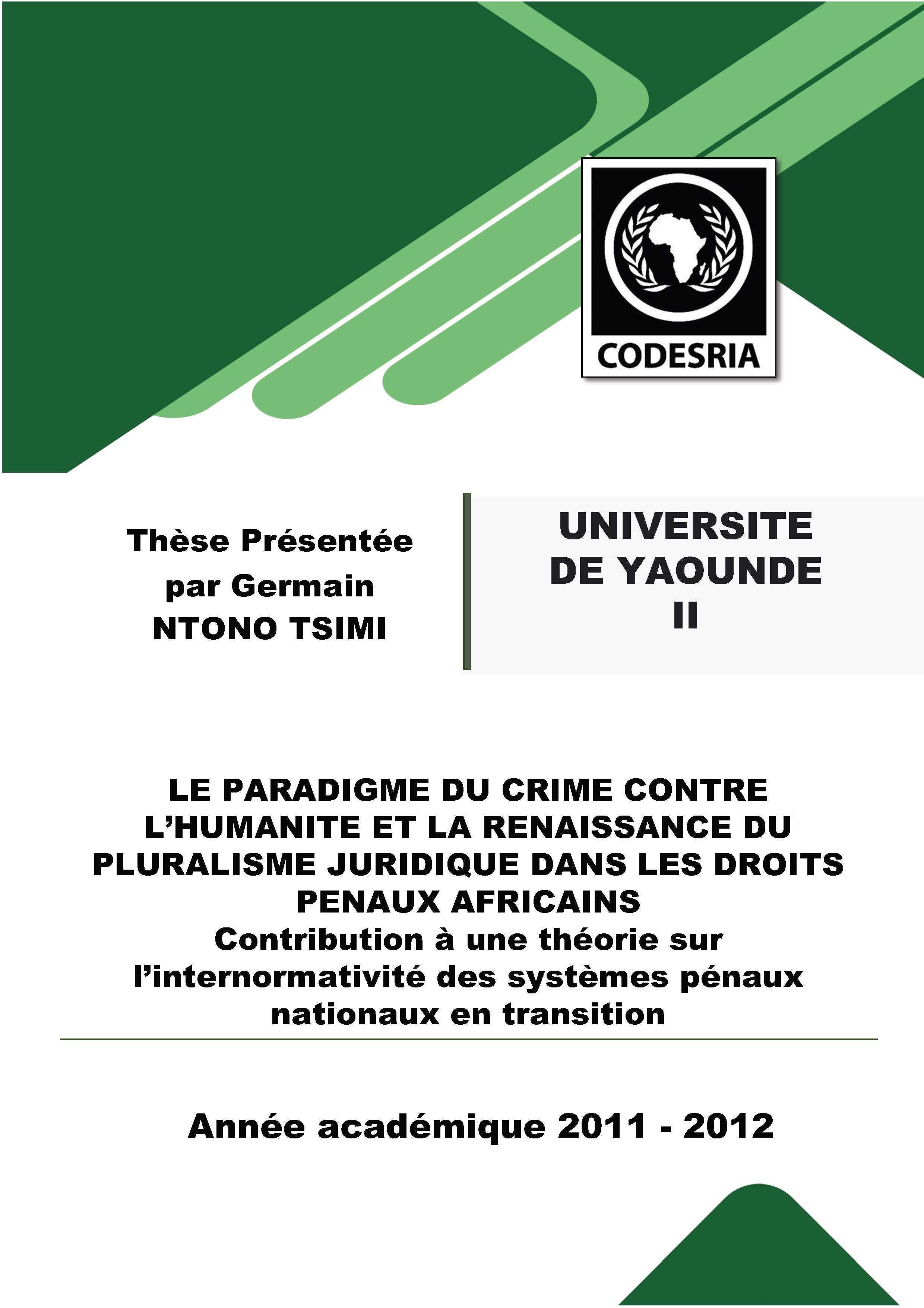LE PARADIGME DU CRIME CONTRE L’HUMANITE ET LA RENAISSANCE DU PLURALISME JURIDIQUE DANS LES DROITS PENAUX AFRICAINS: Contribution à une théorie sur l’internormativité des systèmes pénaux nationaux en transition
Keywords:
crime contre humanité, pluralisme juridique, internormativité, systèmes pénaux nationauxSynopsis
Go in search of an internormative theory in the African’s penal systems lead to the analysis of the new structuring of legal orders and legal norms that form those legal systems. In the postmodern era, such a study which sets out the rethinking of normative composition of the national penal field in the light of the “force agissante” of a new legal paradigm necessarily requires the transcending of the conceptual bounds establish by a long-standing meta legal paradigm unanimously known as “state control” criminal law. The penal doctrine considers this legal paradigm as one classical paradigm because it limits the formal conception of the African post independence criminal law in the kelsenian perspective of legal order. From the creation of the norm to its concrete application everything is read in a dominated monistic perspective. In the sixties, the aim of the first dynamic criminal codification observed in the new African state was to permit the transition from the pluralism of separation to the utopian legal unity.
However, since the beginning of XXIe century, the African’s penal systems, following the example of the Europeans, seem more marked by the metaphor of link and the metaphor movement. Therefore a new legal paradigm is merging called: paradigm of crime against humanity. The normative dynamics that flow from that new paradigm show up two mains consequences. Firstly, the necessary reorganization of the normative power in the criminal system (reorganization of the relationship between intern and international legal order, between the authentic legal norm and the received norm). Secondly, a new dynamic of expansion and normative creation is set up. The traditional principles are renewed (principle of legality), the classical concept are developed (the concept of opened incrimination), the new notions appears in the criminal system (collective criminal responsibility), the new legal logic are in progress (the complementary hierarchy gradually succeed to the strict hierarchy; judges affirm a large normative power). Globally thus, the new paradigm of crime against humanity suggests the idea that African’s penal systems are in loss of their natural boundaries which introduce them in the transition from post colonial “simply” models to postmodern “complex” models.
The highlighted thesis of communicability between different legal orders that structure the African penal field valid the idea of revival of the legal pluralism in African criminal law. First, it postulates a non linear conception of legal norm and legal order in the African context. Second, it legitimizes the application of the theory of complexity as an epistemic theory to study contemporary African penal systems. In the glance of its implication, the communicability of legal orders thesis confers to the emerging paradigm the power of a meta legal paradigm which announces the crisis of the “state control” criminal law paradigm considering the fact that it raises the phenomenon of internationalization of criminal law.
Downloads
References
OST (F.) et VAN DE KERCHOVE (M.), De la pyramide au réseau ? Pour une théorie dialectique du droit, Bruxelles, Publications des facultés universitaires Saint-Louis, 2002.
PAPATHEODOROU (T.) et MARY (Ph.), (dir.), Mutations des politiques criminelles en Europe, Groupe européen de recherches sur les normativités pénales et Université du Péloponèse, éd., Papazissis, 2006.
POUND (R.), Fundamental principles of sociology of law, Cambridge, Harvard University Press 1936.
POURZAND (P.), L’internationalisation pénale en matière de trafic de drogue : étude critique de l’enchevêtrement des espaces normatifs, Paris, LGDJ, 2008.
ROBERT (Ph.), SOUBIRAN-PAILLET (F.), VAN DE KERCHOVE (M.), (dir.), Normes, normes juridiques, normes pénales. Pour une sociologie des frontières, Paris, L’Harmattan, tome.1, 1997.
ROULAND (N.), L’Etat français et le pluralisme, Paris, Odile Jacob, 1995.
ROUSSEAU (D.), (dir.), Le droit dérobé, Actes du colloque de Montpellier Faculté de droit 10 et 11 avril 2003.
RUIZ FABRI (H.), (dir.), Procès équitable et enchevêtrement des espaces normatifs, Paris, SLC, 2003.
SHELTON (D.) (dir.), Commitment and compliance : the role of non-biding norms in the international legal system, Oxford, Oxford University Press, 2000.
THIBIERGE (C.) et alii, La force normative. Naissance d’un concept, Paris/Bruxelles, LGDJ/Bruylant, 2009.
TOURARD (H.), L’internationalisation des constitutions nationales, Paris, LGDJ, coll. « Bibliothèque constitutionnelle et de science politique », t. 96, 2000.
TORCOL (S.), Les mutations du constitutionnalisme à l’épreuve de la constitution européenne. Essai critique de l’ingénierie constitutionnelle, Thèse Toulon, 2002.
VAN DROOGHENBROEK (S.), La proportionnalité dans le droit de la convention européenne des droits de l’homme. Prendre l’idée simple au sérieux, Bruxelles, Bruylant,2001.
YOUROW (H. C.), The margin of appreciation doctrine in the dynamics of European human rights jurisprudence, The Hague/Boston/London, Kluwer Law International, 1996.






